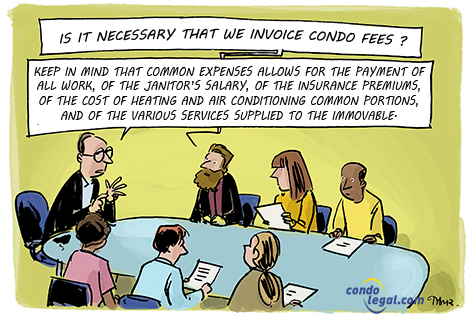Financial documentation
 When you buy a unit in divided co-ownership, you do not only acquire an apartment. You also join a group of co-owners responsible for the accounts to be paid to maintain and preserve the building. It is therefore important to be careful and to check, upstream, the financial statements and the good management of the syndicate. To get a clearer picture, the two basic questions to ask are: Have the directors put in place an appropriate management? And do they have a good control of its financial component? To find out, you should ask questions to your vendor and the syndicate. This will allow you to see whether the co-ownership follows rigorous accounting methods or not.
When you buy a unit in divided co-ownership, you do not only acquire an apartment. You also join a group of co-owners responsible for the accounts to be paid to maintain and preserve the building. It is therefore important to be careful and to check, upstream, the financial statements and the good management of the syndicate. To get a clearer picture, the two basic questions to ask are: Have the directors put in place an appropriate management? And do they have a good control of its financial component? To find out, you should ask questions to your vendor and the syndicate. This will allow you to see whether the co-ownership follows rigorous accounting methods or not.
Current year budget (or “budget forecast”)
The current year's budget, also known as the "budget forecast" should be scrutinized. This includes the amounts required to pay for current expenses, as well as those for the contingency fund and the self-insurance fund. Expenditures related to the use of the restricted common portions must also be an integral part of this budget. This means calculating the sums to be paid by the co-owners who have exclusive use of these. Once adopted, this budget will establish the amount of contributions specific to each of the co-owners, so that all pay their fair share of common expenses to meet the expenses of the co-ownership.
If it is a new divided co-ownership, the developer will have to prepare a budget including the detailed expenses for the building. This budget must cover the period starting from the day the declaration of co-ownership has been published at the Registry Office. This first budget must include a statement of the debts and claims, a balance sheet and information about the common expenses, including the contributions to the contingency fund. For information about subsequent budgets, please refer to the factsheet Budget forecast and expenses of the co ownership.
Financial statements
Every syndicate of co-owners must keep at the disposal of the co-owners its financial statements. that will They reveal the financial health (balance sheet) of the co-ownership, its financial performance, the statement of results and the status of the evolution of the net assets. This information must be passed on request to a potential buyer. However, the law does not set any standards for financial statements and does not specify who should prepare them. Some declarations of co-ownership provide that the financial statements shall be audited by a certified professional accountant (CPA), which shall proceed to an examination. The latter will conduct a review engagement or audit engagement to establish, among other things:
- The syndicate's assets and liabilities.
- The financial performance (excess or loss) of the co-ownership;
- The amount of common expenses to be collected;
- The details of the accounting positions;
- Comparisons with the previous year and/or the budget.
It should be noted that in a small complex held in divided co-ownership, administrators could be content with a "Notice to the Reader"(compilation engagement). This notice states, on each page of the financial statements, that a CPA has not conducted any audit or review mission in relation to the financial information provided. These may therefore be incomplete for the purposes of the reader.
Statement of common expenses for the immovable and the coveted unit
Obtaining the statement of common expenses will allow you to verify the common expenses payable in relation with the coveted fraction. If there are unpaid expenses or paid-in-advance expenses, there should be adjustements between the vendor and the purchaser, during the transaction before the notary.
How can I obtain the required documentation?
Section 1068.2 C.c.Q., introduced in the Code by Bill 16, requires the syndicate to hand over documents or information that will allow the a promising buyer to make an informed and enlightened decision. Parliament states that documents and information must be provided diligently to the promising purchaser, at his own expense, subject to privacy provisions, such as those stipulated in sections 37 to 41 of the Civil Code of Quebec.
These documents and information relate, essentially, to those relating to the building and the syndicate. Once forwarded to the promising buyer, the owner concerned must also be informed, so that all parties have the same information. To learn more about this, refer to the question/answer that specifies how to access the documentation of a co-ownership.
 WHAT YOU SHOULD KNOW! A promising buyer has every interest in checking, upstream, the state of the syndicate's finances and its good management. In this regard, he must obtain the financial documentation of the co-ownership and verify (among other things) the position called "debtor co-owners". If several co-owners have outstanding common expenses, the cash flow will be weakened, so that the union syndicate may no longer be able to meet its financial obligations and be forced to apply for additional funds (special assessment) from other co-owners.
WHAT YOU SHOULD KNOW! A promising buyer has every interest in checking, upstream, the state of the syndicate's finances and its good management. In this regard, he must obtain the financial documentation of the co-ownership and verify (among other things) the position called "debtor co-owners". If several co-owners have outstanding common expenses, the cash flow will be weakened, so that the union syndicate may no longer be able to meet its financial obligations and be forced to apply for additional funds (special assessment) from other co-owners.
 WHAT TO KEEP IN MIND: The financial statements and annual budget of a condominium must be sent to each of the co-owners with the notice calling the annual general meeting. That said, any potential purchaser of a condo should not buy, if it does not have the financial statements and budget of the targeted condominium. If necessary, they can also consult a competent person to have them analyzed.
WHAT TO KEEP IN MIND: The financial statements and annual budget of a condominium must be sent to each of the co-owners with the notice calling the annual general meeting. That said, any potential purchaser of a condo should not buy, if it does not have the financial statements and budget of the targeted condominium. If necessary, they can also consult a competent person to have them analyzed.
 WARNING! Every co-owner must pay general common expenses. They are used to pay for the costs of preservation of the immovable, maintaining and administering the common portions. The co-owners contribute in proportion to the relative value of their fraction. In some cases, a co-owner may also have to pay particular common expenses. These allow the payment of maintenance costs, and sometimes even repairs and replacement of limited-use (exclusive) common portions. These usually include balconies, terraces and windows. The notice of assessment sent by the syndicate to the selling co-owner should provide all the useful details on this issue.
WARNING! Every co-owner must pay general common expenses. They are used to pay for the costs of preservation of the immovable, maintaining and administering the common portions. The co-owners contribute in proportion to the relative value of their fraction. In some cases, a co-owner may also have to pay particular common expenses. These allow the payment of maintenance costs, and sometimes even repairs and replacement of limited-use (exclusive) common portions. These usually include balconies, terraces and windows. The notice of assessment sent by the syndicate to the selling co-owner should provide all the useful details on this issue.
Return to the super file Condominium Shopping Guide





.png)